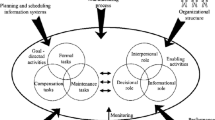Abstract
This paper focuses on time management as a cooperative task. Based on an analysis of the cultural complexity of scheduling surgical operations in a large clinic, possibilities of using information technology are explored. A computer system can be used to facilitate and change the negotiation of resource deployment in complex organizations by a) providing an integrated view of time management problems and decision-making within a complex organization, and b) by improving coordination. The paper discusses some design options for such a system which combines negotiation support with an auromatic sheduling device and critically examines the rationale for an organization to accept and implement such a system.
Similar content being viewed by others
References
Bermann, T., Thoresen, K. 1988. Can Networks Make on Organization? InProceedings of the Conference on Computer-Supported Cooperative Work, 153–166. Portland, Oregon, September 26–28.
Blair, J.H. 1989. Supporting Cooperative Work With Computers: Addressing Meeting Mania. InProceedings COMPCON 208–217. Washington DC. IEEE Computer Society Press.
Cicourel, A.V. 1990. The Integration of Distributed Knowledge in Collaborative Medical Diagnosis. InIntellectual Teamwork. Social and Technological Foundations of Cooperative Work, 221–242. eds. J. Galegher, R.E. Kraut, C. Egido. Hillsdale N.J.: Lawrence Erlbaim Ass.
Durkheim, E. 1976:The Elementary Forms of the Religious Life. London: George Allen & Unwin.
Egger, E., Hanappi, H. 1993.Competence-Switching Managed by Intelligent Systems, Proc. of ISMIS '93, Trondheim, Norway.
Ehrlich, S.F. 1987. Social and Psychological Factors Influencing the Design of Office Communication Systems.Proc. CHI+GI '87 Human Factors in Computing Systems. Toronto, April 5–9, 1987.
Feenberg, A. 1989. A User's Guide to the Pragmatics of Computer Mediated Communication.Semiotica, 75/3–4, 257–187.
Galegher, J., Kraut, R.E. 1990. Technology for Intellectual Teamwork: Perspectives on Research and Design. InIntellectual Teamwork. Social and Technological Foundations of Cooperative Work. 1–20 eds. J. Galegher, R.E. Kraut, C. Egido. Hillsdale N.J.: Lawrence Erlbaum Ass.
Grudin, J. 1989. Why Groupware Applications Fail: Problems in Design and Evaluation.Office: Technology and People, 4(3), 245–264.
Gurvitch, G. 1964.The Spectrum of Social Time. Dordrecht: Reidel Publishers.
Habermas, J. 1971.Vorbereitende Bemerkungen zu einer Theorie der kommunikativen Kompetenz. Frankfurt: Suhrkamp.
Hägerstrand, T. 1975. Space, Time and Human Condition. InDynamic Allocation of Urban Space ed. A. Karlquist Farnborough: Saxon House.
Hassard, J. 1990. Time and Industrial Sociology. InTime Work. and Organization. eds. P. Blyton et al. London and New York, Routledge. 13–31.
Hassard, J. 1990. Time and Organization. InTime,Work and Organization, 79–101 eds. P. Blyton et al. London and New York, Routledge.
Hirschhorn, L., Farquhar, K. 1985. Productivity, Technology and the Decline of the Autonomous Professional.Office Technology and People, 2: 245–265.
Huber, G.P. 1982. Group Decision Support Systems as, Aids in the Use of Structured Group Management Techniques.DDS-82 Conference Proceedings 96–108.
Leithäuser, T. 1990. Exkurs: Sprache and Wissen im interdisziplinären Technikdialog, Senghaas-Knobloch E., Volmerg B.Technischer Fortschritt und Verantwortungsbewuβstein. Opladen: Westdeutscher Verlag.
Luhmann, N. 1980. Temporalisierung von Komplexität. Zur Semantik neuzeitlicher Zeitbegriffe.Gesellschaftsstruktur und Semantik Bd I, 235–300. Frankfurt.
McGrath, J.E. 1990. Time Matters in Groups. InInttectual Teamwork., Social and Technological Foundations of Cooperative Work, eds. J. Galegher, R.E. Kraut, C. Egido 23–61, Hillsdale N.J.: Lawrence Erlbaum Ass.
McGrath, J.E., Kelly, J.R. 1986.Time and Human Interaction: Toward a Social Psychology of Time, New York: Guilford Press.
Moore, W.E. 1963. The Temporal Structure of Organizations. InSociologicalm Theory, Values and Sociocultural Change ed. E.A. Tiryakian, London: Free Press.
Murnighan, J.K., Conlon, D.E. 1991. The Dynamics of Intense Work Groups: A Study of British String Quarters.Administrative Science Quarterly, 36, 165–186.
Quinn, J.B., Paquette, P.C. 1990. Technology in Services. Creating Organizational revolutions.Sloan Management Review, Winter, 67–78.
Robey, D., Farrow, D.L., Franz, C.R. 1989. Group Process and Conflict in System Development.Management Science 35/10: 1172–1191.
Smith, K., Berg, D. 1987.Paradoxes of Group Life. San Francisco. Jossey-Bass.
Strauss, A. 1979.Negotiations. San Francisco. Jossey-Bass.
Strauss, A. Fagerhaugh, S., Suczek, B., Wiener, C. 1985.Social Organization of Medical Work, Chicago: The University of Chicago Press.
Thompson, E.P. 1967.Organizations in Action. New York: McGraw-Hill.
Wagner, I. 1991a. Transparenz oder Ambiguität? Kulturspezifische Formen der Aneignung von Informationstechniken im Krankenhaus.Zeitschrift für Soziologie, 4, 275–289.
Wagner, 1991b. Groupware zur Entscheidungsunterstützung als ein Element von Organisationskultur. InKooperative Arbeiten und Computerunterstützung: Stand und Perspektiven, ed. H. Oberquelle, 175–188. Göttingen/Toronto: Verlag für Psychologie Dr. J.C. Hogrefe.
Wagner, I. 1993a. Caught in a Web of Fuzzy Problems. Confronting the Ethical Issues in Systems Design.Communication of the ACM. Special Issue on Participative Design.
Wagner, I. 1993b. Problems in Defining a Common Working Culture.Workshop on Social Science Research, Technical Systems and Cooperative Work, CNRS Paris, March 8–10.
Weick, K.E. 1985. Sources of Order in Underorganized Systems: Themes in Recent Organizational Theory. InOrganizational Theory and Inquiry, ed. Y.S. Lincoln, 106–136, Beverly Hills: Sage.
Zerubavel, E. 1979.Patterns of Time in Hospital Life. Chicago: The University of Chicago Press.
Author information
Authors and Affiliations
Rights and permissions
About this article
Cite this article
Egger, E., Wagner, I. Negotiating temporal orders. Comput Supported Coop Work 1, 255–275 (1992). https://doi.org/10.1007/BF00754330
Received:
Accepted:
Published:
Issue Date:
DOI: https://doi.org/10.1007/BF00754330




